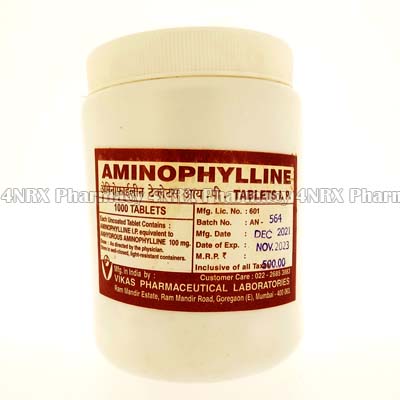 |
Home  Asthma Asthma  Aminophylline (Aminophylline) Aminophylline (Aminophylline) |
|
|||||||||
|
|
Aminophylline (Aminophylline)
What is Aminophylline (Aminophylline) used for? Aminophylline (Aminophylline) is an oral bronchodilator used to treat patients with asthma or chronic obstructive pulmonary disease (COPD). The medication operates by relaxing the airways and muscles in the lungs to allow easier and more comfortable respiration. With regular use, this treatment can prevent asthma attacks from occurring. Your doctor may also prescribe its use for the treatment of other unlisted conditions. How should I use Aminophylline (Aminophylline)? Always use Aminophylline (Aminophylline) according to your doctor`s instructions to get the safest and most effective results from treatment. The normal dosage is one tablet administered two to four times each day. Your particular directions will be based on your age, weight, health condition, and the severity of your symptoms. These should be swallowed with a large glass of water and may be taken on an empty stomach, although a meal is suggested prior to use if you experience nausea. Never change the form of the tablets by splitting or crushing them as this may destroy or alter the effects of their contents. Ask your doctor any questions you have about the medicine to ensure the correct administration. What are the side effects of Aminophylline (Aminophylline)? Some patients have reported experiencing side effects while using Aminophylline (Aminophylline) including:
Stop using the medication and contact your doctor as soon as possible if you experience any intense or worrying side effects such as irregular heartbeats, chest pain, trouble breathing, severe nausea, vomiting, or signs of an allergic reaction such as hives, swelling, or trouble breathing. These conditions may require lower doses, reduce administration frequency, or emergency medical attention in serious cases to prevent further health problems from occurring. Please Note Do not begin using Aminophylline (Aminophylline) if you are allergic to xanthine medications, have had a bad reaction to similar treatments in the past, if the patient being treated is a child, or if you have a have a history of seizures, or porphyrias. Also inform your doctor if you have chronic alcoholism, hyperthyroidism, a viral infection, heart failure, arrhythmias, a peptic ulcer, severe hypertension, or liver disease. These conditions may cause unexpected health problems requiring special alterations to your treatment. Strictly use Aminophylline (Aminophylline) as prescribed and follow all instructions provided by your doctor. Safe, suitable, and optimum dosage can vary and is dependent on the patient`s health and medical history, as well as the condition you are treating. Aminophylline (Aminophylline) may not be safe or suitable for all patients. Always ensure your doctor is informed if you are pregnant or breastfeeding, using any other type of medication (including non-prescription medicine, vitamins, and supplements), as well as if you have any allergies, other illnesses, or pre-existing medication conditions. Seek immediate medical attention or proceed to your nearest accident and emergency department if you suffer a hypersensitive or allergic reaction. Symptoms usually present during a reaction of this nature include difficulty breathing or swallowing, swelling of the limbs or face, tight chest, hives, and skin rashes. 
|
||||||||||||||||||